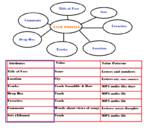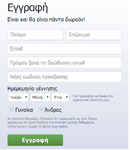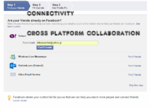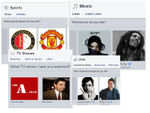|
|
| (104 intermediate revisions by the same user not shown) |
| Line 1: |
Line 1: |
| '''users profile'''
| | [[File:800px-User Profile Info Model.png|150x150px| user profile info model]] |
| | [[File:Fbprofile.png|150x150px|Providing your birthday helps make sure you get the right Facebook experience for your age and its free]] |
| | [[File:cross.png|150x152px|cross platform integrity]] |
|
| |
|
| a collection of settings and metadata---
| |
|
| |
|
| profile-portrait-profiling//user
| |
|
| |
|
| as a linguistic construction that mediates what we think we are/how we present and understand ourselves
| |
|
| |
|
| [[File:800px-User Profile Info Model.png|222x222px|framed|right|user profile info model]] | | SCREENSHOTS FB |
| | | [[File:Fba.png|150px|]] |
| //== opposed to users account as a public expression of it.
| | [[File:Fbaa.png|150px|]] |
| steve-this is imposed by protocols.
| | [[File:Fbaaa.png|150px|]] |
| | | [[File:Fbaaaa.png|150px|]] |
| michael--profiles/=/fanpages/identities
| | [[File:Fbaaaaa.png|150px|]] |
| | | [[File:Fbaaaaaa.png|150px|]] |
| design model- '''database'''
| | [[File:Fbaaaaaaa.png|150px|]] |
| | | [[File:Fbaaaaaaaaaaaaaaaaa.jpg|150px|]] |
| '''user profiles in operating systems
| |
| user profiles in social networking
| |
| user profiles in web2.0 services sites'''
| |
| | |
| | |
| '''sources'''
| |
| | |
| wikipedia -user profile= user profile is a visual display of personal data associated with a specific user, or a customized desktop environment. A profile refers therefore to the explicit digital representation of a person's identity. A user profile can also be considered as the computer representation of a user model. See also Online identity
| |
| | |
| | |
| microsoft-user profile=
| |
| Your user profile is a collection of settings that make the computer look and work the way you want it to. It contains your settings for desktop backgrounds, screen savers, pointer preferences, sound settings, and other features. User profiles ensure that your personal preferences are used whenever you log on to Windows.
| |
| A user profile is different from a user account, which you use to log on to Windows. Each user account has at least one user profile associated with it.
| |
| | |
| Olia lialina lecture-What Was the User?= computers invisible--users to.term getting osbolete. educate users.users -developers.stallman said that in the worlds of free software this would exist,olia disagrees, some would be users again. user is beautiful n imporant word, no excused needed this word needs to stay, t show that they are people using the systems that other s designed, everybody sdoulh become a developer ideallyCornelia: think user as a consumer.for capitalist reason content is beeing locked,consumer protection then??the user is left without choice to the companies.politics should get involved.audience-comment: carefull with connecting user withe barthes dead of author, and coauthor etcto distinguish them , coz barthes is more into intertextuality(f.e curating utube) but here is more about technology. audience-comment:prosumer/maker?someone said that missed this concepts in the discussion maybe user is going in the space of makerspaces?new way of interacting with technology is emerging,prosumer though is in the end a product of companies. the intelligent user-- the maker now,the user--the prosumer.olia--demand ambiguity
| |
| | |
| Olga g lecture- the user as producer of himself. of own individuality,and the user and producer of other, while the medium , the ecology is also produced,erosion between division user-producer000maybe it wasnt existing, as i produce and use myself,engagement of culture and art
| |
| ecologys which via individuals and collectives become,position----cultures, aesthetics specificl understood, that work up subjectivity
| |
| dealing with human condition. cognitive capitalism? subjectivity.
| |
| | |
| | |
| brenda laurel computers as theatre
| |
| | |
| Bush-AWMT
| |
| | |
| Olia lialina and dragan es. Do you believe in users?in digital folklore reader
| |
| | |
| Olia lialina-turing complete user lecture, The General Purpose User
| |
| | |
| Lev Manovich, How do you call a person who is interacting with digital media?
| |
| | |
| Don Norman, Words Matter. Talk About People: Not Customers, Not Consumers, Not Users
| |
| | |
| Dan Gillmore, we the media
| |











